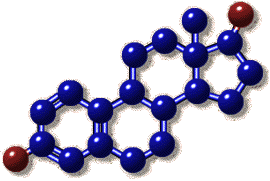



Estrogens are female reproductive hormones which are secreted by the ovaries. They stimulate the proliferation of the lining of the uterus during the estrous cycle of non-primates, and the menstrual cycle of primates (including humans). As well as playing a part in the estrous/menstrual cycle, estrogens function in maintaining female secondary sexual charactistics. The most active form of endogenous (or made in the body) estrogen is estradiol.
Estrogen has beneficial effects in preventing heart disease, osteoporosis, and there is even some evidence that it may help to prevent Alzheimer's disease. However, there is also evidence that estrogen promotes cancers of the breast, uterus, and other organs.
The way that estrogen works is to enter the cells of its target organ, bind with a receptor protein within the cell, which then enters the cell nucleus and interacts with nucleic acids to promote the synthesis of specific proteins.
Phytoestrogens can bind weakly to this estrogen receptor. Here is a table1 comparing the strength of some phytoestrogens to estradiol, and the potent synthetic estrogen diethylstilbestrol (DES):
| In Vitro Bioassaya | In Vivo Mouse Bioassayb |
|
|---|---|---|
| Relative potency in human endometrial adenocarcinoma cells |
Relative potency in mice |
|
| Diethylstilbestrol | 100,000 | |
| Estradiol | 1,186 | |
| Coumestrol | 2.40 | 35 |
| Genistein | 1.00 | 1.00 |
| Equol | 0.72 | |
| Daidzein | 0.16 | 0.75 |
| Biochanin A | <0.08 | 0.46 |
| Formononetin | <0.01 | 0.26 |
(a) Measured by an in vitro bioassay based on
estrogen-specific enhancement of alkaline phosphatase activity
(b) Measured by a standardized mouse uterine weight bioassay
procedure
Reference:
1. Reinli K, Block G. Phytoestrogen content of foods-- a compendium of literature values.Nutrition and Cancer 1996;26(2):123-148
Image source = Center for Bioenvironmental Research (CBR) of Tulane and Xavier Universities, New Orleans, Louisiana, U.S.A.
Back to What Are Phytoestrogens?
Prepared Summer 1997 by Bernadene Magnuson, Ph.D.
University of Idaho, Dept. of Food Science and Toxicology - EXTOXNET FAQ Team.